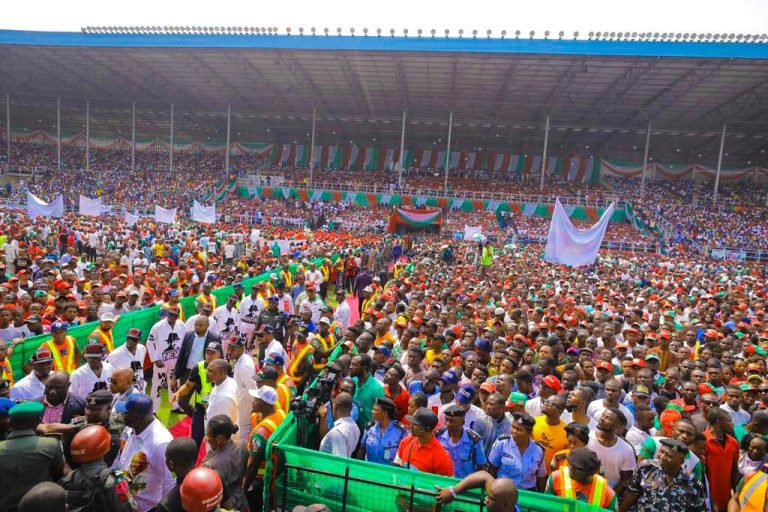
Election campaigns serve as a crucial period for political parties and candidates to engage with the electorate and convey their vision and promises. In Nigeria, as in many other countries, media platforms have become instrumental in shaping public opinion during election campaigns.However, recent research conducted by The Center for Research on Development of African Media, Governance and Society and The Positive Agenda Nigeria (now PANSOR Development Initiative) reveals concerning trends of personality attacks and the spread of misinformation by political stakeholders, particularly on Twitter.
Amidst this backdrop, our analyst explores the role of moral entrepreneurs and the media’s responsibility in amplifying their voices to promote a healthier campaign environment using the same newspapers (Daily Post, The Punch, Vanguard, The Guardian, The Nigerian Tribune and Sahara Reporters) the two organisations used as data sources.
Analysis reveals that the newspapers only gave moral entrepreneurs such as police, civil society organisations, non-governmental organisations, community and religious leaders little space to chide the stakeholders regarding their behaviours that contravened Electoral Act and campaign guidelines at the beginning of the campaign. However, the space increased at the end of the campaign period.
Tekedia Mini-MBA edition 15 (Sept 9 – Dec 7, 2024) has started registrations; register today for early bird discounts.
Tekedia AI in Business Masterclass opens registrations here.
Join Tekedia Capital Syndicate and invest in Africa’s finest startups here.
Our analyst notes that media, comprising both traditional and new platforms, plays a critical role in shaping public discourse and influencing the narrative during election campaigns. It possesses immense power to disseminate information, challenge harmful narratives, and promote ethical conduct among political stakeholders. However, the research findings indicate a missed opportunity during the early stages of the campaign, where mainstream newspapers allocated minimal space for moral entrepreneurs to caution the stakeholders regarding their behaviours that violated Electoral Act and campaign guidelines. This lack of coverage, according to our analyst, potentially contributed to the perpetuation of toxic campaign atmosphere.
Nevertheless, as the campaign period progressed, the media gradually recognized the importance of amplifying the voice of moral entrepreneurs. Increased coverage was observed, reflecting a shift toward highlighting the concerns and messages of police, civil society organizations, non-governmental organizations, community leaders, and religious figures. This positive development reflects the media’s growing recognition of its role as a facilitator of public accountability, encouraging stakeholders to adhere to existing electoral guidelines.
Implications for State and Non-State Actors
The findings of this research carry significant implications for both state and non-state actors involved in Nigeria’s political and electoral institutions.
Strengthening Democracy: The media’s commitment to providing a platform for moral entrepreneurs to voice their concerns reinforces democratic values. By increasing the visibility of responsible actors, the media assists in fostering a healthy political environment that prioritizes issue-based debates and constructive dialogue.
Combatting Misinformation: The media’s expanded coverage of moral entrepreneurs can effectively counter the spread of misinformation and disinformation during election campaigns. By providing accurate information and fact-checking false claims, the media acts as a vital source of trustworthy news, contributing to an informed electorate.
Promoting Accountability: The media’s role in amplifying the voice of moral entrepreneurs encourages greater accountability among political stakeholders. When politicians and parties are aware that their actions and statements will be scrutinized and questioned, they are more likely to adhere to ethical behavior and campaign guidelines, thereby fostering transparency and integrity in the electoral process.
Fostering Civic Engagement: By showcasing the efforts of moral entrepreneurs, the media motivates citizens to actively engage in the political process. When individuals witness the impact of responsible actors on campaigns, they are inspired to participate, either by voting or by becoming advocates for positive change, thereby strengthening the democratic fabric of the nation.
In Nigeria’s evolving political landscape, the media serves as a powerful catalyst for change during election campaigns. Recognizing the significance of its role, the media must prioritize the amplification of the voices of moral entrepreneurs who seek to uphold ethical conduct and accountability among political stakeholders.
By providing substantial coverage and support to these responsible actors, the media can foster a campaign environment that encourages issue-based discussions, combats misinformation, promotes civic engagement, and strengthens democratic values. As Nigeria moves forward, it is crucial for media organizations, electoral institutions, and stakeholders to collaborate in fostering an inclusive and informed electorate, thereby ensuring the growth and sustenance of a vibrant democratic system.



